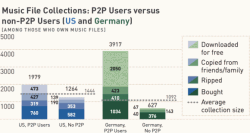Welcome to the pre-Black-Friday-Deals-Week WNR. I went kind of crazy with last year’s Amazon BF Blu-ray sales, obsessively listing and updating the latest Blu-ray deals despite almost nobody, other than myself, actually reading what I was writing. This year’s discount calendar has already been leaked, but there’s almost nothing there that actually interests me, so I don’t think I’ll be as obsessed as I was last year. It also helped that most of the good Blu-ray deals last year happened at a good time zone for people here in Australia, and that most of the discs listed were region-free (this time, there seems to be quite a few Fox Blu-ray deals, which are all region-locked). Amazon UK is doing their BF thing as well and I’ll check them out, but stock seems to be quite limited last year, although this only makes it more exciting in my opinion.
News was a bit more plentiful this week, so let’s get started.

The RIAA has responded to a recent report that found P2P users, those that downloaded a lot of pirated music, were also bigger spenders generally. Instead of denying the link, something that’s hard to do when other studies back up the same assertions, the RIAA appears to have created their very own straw man argument, that P2P usage is not the *cause* of increased music spending.

The RIAA responds to American Assembly’s Copy Culture Survey, claiming there’s no causation link between P2P usage and increased purchasing (not that a lot of people made those links)
I’ve read a few articles that reported on the issue, as well as writing and commenting on the story myself, but at no point did I find an article that seem to suggest P2P usage was the cause behind the same user’s bigger spends. What most correctly identified, and a point which the RIAA concedes, is that P2P users were more engaged users, bigger music fans, and so naturally, they also purchased more stuff. Or as I originally wrote when responding to the report, “people who download a lot of music actually love music, probably more so than people who don’t download as much. And music lovers buy more music.”
But now that the RIAA has mentioned it, maybe there is a causation link between piracy and spending. If we take piracy as a music discovery service, than perhaps it’s this unlimited access to music that creates more engaged users, rather than simply a case of piracy being more attractive to already engaged users. Perhaps people whose music experience is limited by their budget cannot ever become as big fans as those that choose to exceed this limit, even if it means doing things illegally.
Regardless of whether this is true or not, the fact is that pirates are also the music industry’s best customers, and marginalising and disregarding this core group might reduce piracy rates, but will not help you increase revenue. It might even do the opposite, especially when the industry is keen to kick these very same people offline.
But one iOS app developer is taking the whole notion of “attacking your customers” to a new level, with their range dictionary apps auto-tweeting to user’s Twitter accounts with a self-confession to pirating the app. The only problem? It’s doing it for users that paid for the app, as well as those that are using pirated versions!
Naming and shaming pirates it not a new thing, but for some reason, these attempts always seem to backfire spectacularly. I guess in the excitement (or anger) of adding this feature, testing the implementation wasn’t the top priority. A tip: if you’re going to name and shame, make sure you’re not the one that ends up feeling shameful.
Piracy is a big problem for app developers, although just like other forms of piracy, I’m not sure if every act of piracy equals a lost sale. But surely pissing off your loyal customers is as costly if not more so than piracy. And then there’s the issue of privacy. Would I trust a developer that developed a secret function to access my Twitter feed, even if it only does it when it detects a pirated copy? Competition is fierce in the app sector, so armed with the knowledge that one app has this privacy issue, and another app doesn’t, I know which one I would choose.
As a side point, that Apple allows this sort of thing to happen (maybe they don’t, and the app developer, Enfour, may get into further trouble for their app’s secret feature) is also slightly disturbing. At least with Android, apps have to list all permissions upfront, and users can choose to disregard any app simply based on the permission list.
——

Alki David’s lawsuit against Viacom/CBS/CNET for distributing LimeWire has now dragged uTorrent and other BitTorrent clients into it, by claiming CNET may be promoting infringing activities by promoting software like uTorrent
David Alki’s lawsuit against CBS/CNET has taken a nasty turn as Alki and his coalition of musicians decide to drag generic BitTorrent clients into the battle as well. In the latest filings, the plaintiffs alleges that CNET’s Download.com is still engaged in the same kind of wrongness as they did with LimeWire, this time by promoting and distributing BitTorrent clients like uTorrent. Even news articles talking up the legal aspect of BitTorrent are attacked for being propaganda pieces to help legitimize something Alki and co. says should be banned.
In the unlikely event that the judge agrees with the plaintiff’s position, this could very well spell the end for other file transfer protocols, including Usenet and FTP. Even HTTP, the backbone of the world wide web (it’s how web pages are transmitted) may be under threat, since I’m sure a significant percentage of HTTP traffic is also related to copyright infringement. In other words, I don’t think Alki and co. have a legitimate leg to stand on with this one.
In fact, when LimeWire was ruled to be illegal, the judgement did not extend to Gnutella or BitTorrent, both protocols that were part of the LimeWire network. Just like how Megaupload’s shutdown did not affect the status of HTTP, which Megaupload relied upon. So until a court rules against every and all BitTorrent clients, they remain perfectly legal.
Shortly after publishing the news article (and writing the above), I received an email from Alki David in which he linked to an interview he conducted with TorrentFreakin response to this latest development in the lawsuit. In the interview, David tries to explain the rationale behind this latest move. David says that he isn’t against P2P software and software makers at all, but instead, he is against the way Viacom/CBS/CNET on one hand pursues the most heavy handed anti-piracy initiatives, and on the other hand “perpetuating file-sharing for their own gain”.
“Viacom is the same company that lobbied for SOPA and arrests, sues and fines kids like Joel Tenenbaum hundreds of thousand of dollars for downloading a handful of songs. The same people who want to have Richard O’Dwyer extradited from the UK for doing something that in the UK is not illegal!
Viacom is the same company that paid millions of dollars to companies like Media Defender and Artists Direct to monitor and police file-sharing whilst these companies profited from porn sites being exposed to young kids looking for other types of content,” David told TorrentFreak, before adding, “I do NOT think that torrent makers should be held liable. They can distribute but not promote the illegal use of their software.”
While David does make a good point, about the hypocritical stands that big content often takes towards copyright infringement (ie. they think it’s perfectly fine if it’s in their interest, or hoy Sony’s fervent use of DRM to protect CDs and DVDs, despite being one of the bigger manufacturers of blanks that pirates were using), I find it hard to believe that CNET would publish anything other than generic how-tos on BitTorrent, and that their legal department would allow the promotion of the illegal uses of BitTorrent. That BitTorrent clients do have legitimate uses, unlike say LimeWire, means that unless CNET wrote how-tos on how to find illegal music and movie torrents, they’re not really doing anything wrong.
His suggested solution to the piracy problem will surely cause more controversy as well. “I would send the ISP of the websites an invoice for a small fee (say 5 dollars) for each torrent download to give to the rights holders. The ISP would have to collect from the customer or pay it themselves,” explained David.

It seems you don’t have to be a victim of piracy on a massive scale in order to lose a billion dollars every year – you can do it by playing to the rules too. According to rival Netflix, Amazon is losing up to $1 billion a year on content licensing. Netflix says they are aware of the losses because they’ve been competing with Amazon with quite a few content distribution deals. For the record, Netflix currently pay $2.1 billion for content every year. $2.1 billion divided by Netflix’s $7.99 x 12 annual fees equal 21,902,377, which kind of makes sense considering the service’s 20-30 million subscribers. Amazon has a lot fewer subscribers, but still have to license the same amount of content if they need to compete, hence the losses. Netflix had the luxury of allowing their content library to grow naturally, Amazon has the more difficult task of having to catch up in a very short period of time.
All of this seem to confirm that, despite their whining about the Internet, it’s boom times for Hollywood at the moment, thanks to competition between Amazon, Netflix and the other players, and some of them overpaying for content just to catch up or gain an advantage over the others.
That’s all folks for the week. Enjoy your Black Friday shopping if that’s your thing, and see you next week.

